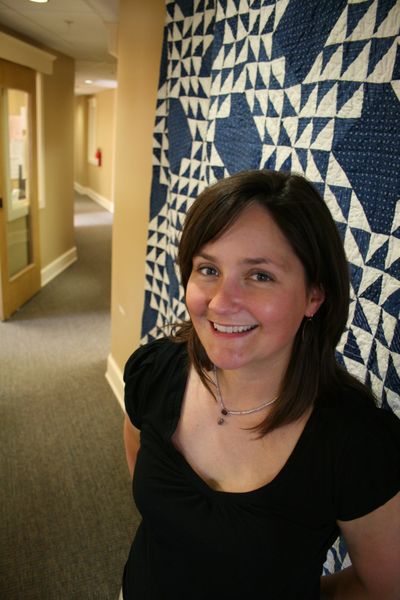Down To Earth Profile: Juliet Sinisterra, Transition Town

When Juliet Sinisterra’s 10-year-old son wrote an essay about global warming last year, the reaction from some of his classmates shocked her.
It wasn’t so much that the comments like ‘oh, my parents don’t believe in that’ were made, since she accepts that not everyone believes climate change threatens us. It’s that so many said it.
And since composting food, gardening, turning off lights, and generally living small are all part of the Sinisterra’s household’s routine, her son was surprised and confused.
Sinisterra, whose life’s work is dedicated to environmental and community causes, is OK that not everyone shares her passion for protecting the planet.
“I’m a sappy person. When I look at pictures of the earth, I well up. I feel a sense of unity,” she says.
Then her tone turns serious, concerned and determined. “The potential for massive amounts of human suffering is substantial. It can break your heart.”
A Spokane native, Sinisterra studied architecture at Washington State University and began her career designing museums and other public projects in Seattle in the late 1980s.
After returning to Spokane to work for Integrus Architecture PS in the 1990s, Sinisterra helped design a major remodel and addition at Gonzaga Preparatory. The project reconfigured the campus so the buildings sit on the perimeter with a terraced meeting space in the middle that people can “spill into,” Sinisterra says, fostering more interaction.
“Building community through the built environment has always been important to me,” she says.
Building community on any scale is at the heart of her mission.
Sinisterra is Catholic, and says she gets her sense of service from her faith. She also enjoys the teachings of other religions and philosophies including Buddhism.
When her son and daughter were young, she became a leader in the local La Leche League, an organization that supports breastfeeding. Through that, Sinisterra developed a network of friends, many of whom she works with today.
During that time, Sinisterra worked from home designing homes and taught space planning at Spokane Falls Community College.
In January 2005, she took part in a “charrette,” an intense design session focusing on the future of the Spokane’s Saranac Building.
At the time, the Main Avenue building was a rundown, vacant hotel. Today, it is a mixed-use facility with offices, a restaurant, a movie theater and a rooftop garden, and earned LEED Platinum certification for its eco-friendly design.
At the Saranac charrette, Sinisterra met Jon Snyder, editor-in-chief of Out There Monthly, a Spokane-based publication about recreation and the environment. Snyder currently is running for Spokane City Council.
Sinisterra began writing about sustainable living for Out There. Soon, she became involved in the Northwest EcoBuilding Guild, a volunteer organization that teaches homeowners and professionals ways to reduce carbon footprints of houses and other buildings. She’s now president of the Guild’s local chapter.
When the time came to find full-time work again, Sinisterra took a role with Community Minded Enterprises rather than return to architecture.
“I love design, but I didn’t think (architecture) was the best use of my time,” she says. “I knew I’d be antsy.”
(By the way, full time to Sinisterra is 32 hours a week. She’d like to see that become a societal norm — any more hours and “people have no time to put into their community, let alone their own families.”)
Community Minded Enterprises promotes a clean environment and access to healthcare for everyone, as well as services for youths, people with disabilities and the disenfranchised.
As the organization’s services director, Sinisterra wears multiple hats. A passion is to help foster microeconomies throughout Spokane so no one needs to travel far for a gallon of milk or a medical checkup.
She’s working on a neighborhood-by-neighborhood analysis of what services are currently offered and what opportunities exist for businesspeople to fill a need.
Sinisterra has developed programs for youths in poverty and the mentally ill, and helped start a green consulting service that assesses day-to-day waste, energy and water use and other sustainability issues for companies.
In the future, she hopes to build an online carpool network, where drivers and riders could log on, look up a particular time and location, and find someone willing to share a ride.
Not only do programs like that help lessen the strain on the environment, they strengthen the ties of the community.
“There’s a richness that comes from interacting and connecting with people,” Sinisterra says.